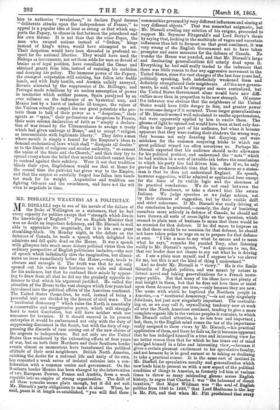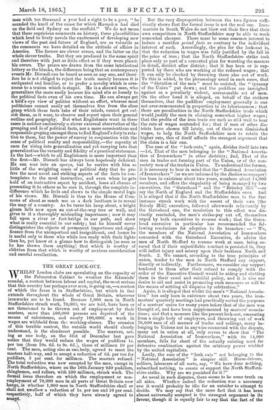MR. DISRAELI'S WEAKNESS AS A POLITICIAN.
Air, R. DISRAELI says in one of his novels of the failure of ill the Duke of Wellington as a statesman, that he had every capacity for politics except that "strength which lies in the knowledge of England." For an English Minister that was no doubt an important deficiency, and Mr. Disraeli is well able to appreciate its magnitude, for it is his own great stumbling-block. On Monday night, in the debate on the defences of Canada, he made a speech which delighted his admirers and fell quite dead on the House. It was a speech With glimpses into much more distant political vistas than the ordinary perspective of English politicians includes,—the sort of speech which indistinctly stirs the imagination, but illumi- nates no issue immediately before the House,—nay, tends to obscure and entangle it. The truth was that he not only opened out his views into horizons too wide and distant for his audience, but that he confused their minds by appear- ing to draw from all that he did say the precisely opposite in- ference to that which his argument justified. He called the attention of the House to the vast changes which four years had introduced into the political affairs of the American continent. The United States themselves, he said, instead of being a powerful unit are divided by the fiercest of civil wars. The "territorial democracy" which rules the North is essentially a conservative and unaggressive power, which will struggle hard to resist dissolution, but will have neither wish nor resources for invasion. If it should succeed in its present enterprise it would be embarrassed not only with the duty of suppressing discontent in the South, but with the duty of sup- pressing the discords of race arising out of the new claims of the negroes to independence. But not only are the United States thus weakened by the exhausting efforts of four years of war, but on both their Northern and their Southern border events almost as momentous have transformed the political attitude of their next neighbours. British North America, catching the desire for a national life and unity of its own, has cemented a weak series of isolated colonies into a con- federation with a common centre and government. On the Southern border Mexico has been changed by the intervention of two European Powers, France and Austria, from a weak republic into an empire of strong organization. The drift of all these remarks seems plain enough, but it did not suit Mr.. Disraeli's party-obligations to make it clear. When, he said„peaoe is at length re-established, "you will find these communities governed by very different influences and aiming at very different objects." That was somewhat enigmatic but Mr. Disraeli evading any solution of his enigma, proceeded to. support Mr. Seymour Fitzgerald's and Lord Derby's thesis by saying that, looking to the multitude of vague and uncertaim influences thus left to ferment on that great continent, it was- very wrong of the English Government not to have taken prompter and surer measures for the defence of Canada. No wonder the House was puzzled, and that Mr. Disraeli's large- and fascinating generalizations fell utterly dead upon it. Everything he had said really tended to the inference that there was little reason to fear any aggressive movement in the United States, since the vast changes of the last four years had,, politically speaking, both indefinitely weakened them and definitely strengthened their neighbours. All the new govern- ments, he said, would be stronger and more centralized, but the United States Government alone would have new diffi- culties more than in proportion to its new strength. Of course the inference was obvious that the neighbours of the United States would have little danger to fear, and greater power- to overcome danger if it occurred. Those larger generalizations of Mr. Disraeli seemed well calculated to soothe apprehensions, but were apparently applied by him to excite them. The gleams of light he opened out would have been at best only daz-. sling to the larger part of his audience, but when it became apparent that they were casting their shadows the wrong may, they became not only dazzling but dizzying, and were- mistaken for the common conjuring tricks to which our great political wizard too often accustoms us. Perhaps Mr. Disraeli expected that his audience should make allowance for his political position, and understand the " nots " ,which he had written in a sort of invisible ink before the conclusions. to which his party ties had driven him. But if so, he only proved for the hundredth time that his weakness as a states- man is that he does not understand England. No speech, however suggestive, will be admired or applauded., here except for the force of its visible logic and the clearness of its practical conclusions. We do not read between the lines like Frenchmen, or take a shrewd hint like astute Italians. We judge speeches as we judge actions, not by their richness of suggestion, but by their visible drift and strict coherence. If Mr. Disraeli was really driving at the conclusion he professed,—namely, the duty of bestirring ourselves more actively in defence of Canada, he should not have thrown all sorts of cross-lights on the question, which seemed to plain men of business to mean that there would be- no occasion for that defence. If he did mean to impress on us that there would be no occasion for that defence, he should not have taken pains to urge on us to prepare for that defence at once. "I like a man to say what he means and to mean what he says," remarks the puzzled Tory, after listening coldly to Mr. Disraeli's speech, "and it appears to me, Sir, that our leader does not choose to say out what he is driving at. I am a plain man myself, and I suppose he's too clever for me but this is not the kind of thing I understand:" And no doubt Mr. Disraeli is " viewy." He is the Emile Girardin of English politics, and was meant by nature to invent novel and taking generalizations for a French news- paper public. Not that many of his ideas have not plenty of real insight in them, but that he does not love them or insist upon them because they are true,—only because they are new. The name with which he baptized the Northern people in America,—a "territorial democracy,"—is not only singularly felicitous, but just now singularly important. The centraliz- ing or, as we may call it, crystallizing tendency now at work all over the North American continent, tending to give a more complete organic life to the various peoples it contains, to which Mr. Disraeli called attention, is no less true and important ; but, then, to the English mind comes the test of the importance really assigned to these views by Mr. Disraeli,—his practical application of them, and there he fails us, for it becomes apparent that he has indulged himself in a true and interesting view for no better reason than that for which he has times out of mind indulged himself in a false and interestinc, view —because it gives a certain pleasant excitement to hi:speculative faoulty, and not because he is in good earnest as to taking or declining to take a practical course. It is 'the -same sort of instinct in Mr. Disraeli for speculative novelty and generalization which now leads him to present us with a new aspect of the political condition of things in America, as formerly led him at various. times to throw so many misleading gleams across English history, to argue that Charles I. was "the holocaust of direct taxation," that Major Wildman was "the soul of English politics from 1640 to 1688," that Lord Shelburne is the Amy to Mr. Pitt, and that when Mr. Pitt proclaimed that envy man with ten thousand a year had a right to be a peer, "he sounded the knell of the cause for which Hampden had died on the field and Sydney on the scaffold." We do not mean that these capricious comments on history, these plausibilities which lend to lively novels the excitement of developing new views of the past and future of England, are as valuable as the comments we have detailed on the attitude of affairs in America. The former are clever errors, and the latter on the whole clever truths. But they are produced in the same spirit and therefore with just as little effect as if they were plausi- ble errors. The prizes are drawn from the same intellectual lottery as the blanks, the difference being that on contemporary events Mr. Disraeli can be heard as soon as any one, and there- fore he is not obliged to reject the truth merely because it is antiquated and familiar, or to prefer a novelty which is erro- neous to a truism which is stupid. He is a shrewd man, who generalizes the more easily because his mind sits so loosely to the political facts even of his own time. He can always get a bird's.eye view of politics without an effort, whereas most politicians cannot easily set themselves free from the close grasp which these facts take of their minds, cannot get out- side them, as it were, to observe and report upon their general outline and geography. But what Englishmen want in these cases is neither exclusively a clever external observation of the grouping and lie of political facts, nor a mere conscientious and responsible groping amongst them to find England's duty in rela- tion to them, but the power of survey in conjunction with the sense of political reality and responsibility,—the capacity at once for rising into generalization and yet carrying into that generalization the veracity and fidelity of a practical statesman. In the last—which to all Englishmen is more important than the first—Mr. Disraeli has always been hopelessly deficient. He can soar into an apergu, but he carries with him so little of the weighting sense of political duty that he pre- fers the most novel and striking aspects of the facts he con- templates to the most instructive, and even when he gets hold of an instructive aspect by accident, loses all chance of presenting it to others as he sees it, through the complete in- difference which he feels and shows to the simple moral logic of his views. Mr. Disraeli is thus to the House of Com- mons of about as much use as a dark 'anthem is to reveal the map of a country. As he turns his lamp about, a bright gleam falls now upon an out-of-the-way tree or wall, and gives to it a thoroughly misleading importance ; now it may fall upon a river or foot-bridge in our path, and show what is really essential to our safety ; but he himself never distinguishes the objects of permanent importance and signi- ficance from the unimportant and insignificant, and hence he is useful only to those who while less ready with their lights than he, yet know at a glance how to distinguish (as soon as he has shown them anything) that which is worthy of oblivion from that which is worthy of anxious consideration and careful recollection.































 Previous page
Previous page